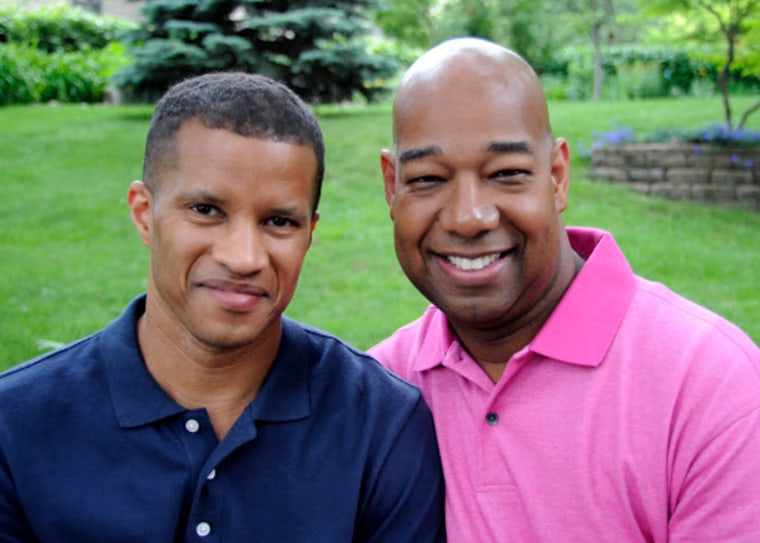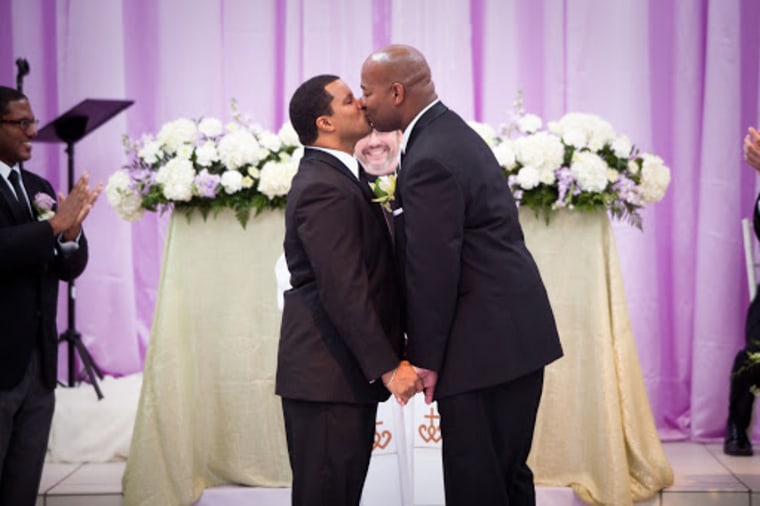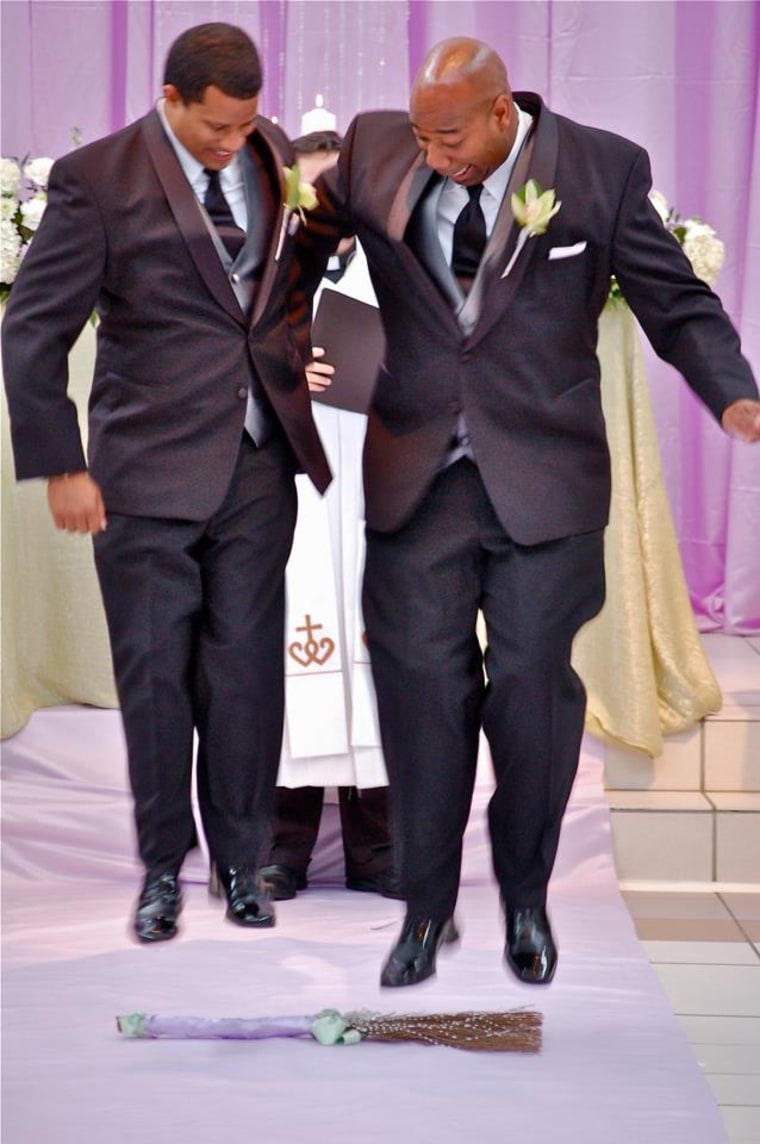In August 2015, we will celebrate our 24th year as a family. We are college sweethearts who met at Howard University in the early 1990s. Howard’s campus was in the midst of a period when students wrestled with how to define blackness as we approached the dawn of a new century, setting up a confrontation between “Cosby Kids” with advantages they took for granted and urban youth who had greater access to higher education. No matter how we defined blackness, all sides agreed that there were certain norms of gender and sexuality that were inviolate.
As soon as we found each other and fell in love, we were on the wrong side of what was expected of us. While we thought our relationship flew under the radar, the sexuality police around campus thought differently. We could not hide so powerful a connection and commitment and were soon ostracized for being more than just friends. Kareem was even attacked, his assailant yelling, “faggot” as he lunged at Kareem’s neck. These were hard lessons for 20-year-old students to learn, especially when all you wanted were good grades and a great boyfriend. It was harder, given how broadly defined and highly valued “family” was on a black college campus. It hurts when one side of a family turns its back on another, betraying professed core values.
Access to your spouse’s health care, benefits, retirement income, and yes, pay, are critical to ensuring that black families escape poverty and the constant struggle of life on the margins.
And yet we committed to love, honor, and cherish each other for as long as we live. While we were young, excited, and hopeful, we were also alone, no support from family and no protection from the law or the government. All we had to hold us together was our word. We exchanged rings and called each other husband, but we were reminded everyday by stores, banks, neighbors, and insurers that we were not really married.
Through considerable time and expense, we secured legal documents that, in the hands of the right judge or administrator, could be seen as a clear indication of our intention to share our lives and fortunes with the other like couples who were legally married. Without marriage equality, we remained vulnerable to the whims, biases, and oversight of a legal system, businesses, and community that did not see us as equal under the law.

We persevered, lacking the supports and validation that other young couples had. While we could not get legally married as we had hoped after graduation, we struck out to build our own family. Our union invited even more love and support from other couples. The family we built over 23 years is so much thicker than blood. It extends from South Florida to the Canadian border, from the nation’s capital to California. You see, it turns out that the sexuality police we encountered in the 90s ultimately lacked the authority they claimed.
We built an authentic black family, as strong and nurturing as any other this country has ever produced. At the dawn of yet another marriage equality victory for same-sex families, we have a glimpse into the joy our parents and grandparents must have felt at the civil rights victories of the Warren era of the Supreme Court.
While we built our own family, sometimes without the support of our blood relatives, we knew that we remained vulnerable without the protection of government and equality under the law. When we started out, our own birth families could not support us. By the power of our word and commitment to each other, we found out how to be the kind of family that could thrive and affirm. We are now working to ensure other black families that look a little different than what’s shown in Jet and Ebony are not left behind and find the support they need to thrive. That’s what was at stake before the Supreme Court. Access to your spouse’s health care, benefits, retirement income, and yes, pay, are critical to ensuring that black families escape poverty and the constant struggle of life on the margins.
The denial of our basic human right to marriage equality creates real harm and violates our most basic aspiration to equality under the law.
Yes, this struggle continues to be a personal one for our family. Two siblings and two other couple friends of ours selected us to be the guardians of their children should they die. That’s seven children entrusted to our care. Without full marriage equality, there are places where we would not be able to take our family without fear of inadequate legal protections. School trips to Texas, family trips to Mississippi, or business trips to North Dakota are, in effect, forays into legally hostile territory where we lack legal protections and our status as guardians becomes suspect. We have children in our lives to whom we give all our love, support, and guidance, and the last thing they need is for our government to place barriers around that, to limit how much we can express love to our families.

The Supreme Court has it within its power to end the disparate treatment of our family and of all families by affirming what we already know to be true—the denial of our basic human right to marriage equality creates real harm and violates our most basic aspiration to equality under the law. The question we would ask: are you willing to harm our family’s life, harm a loving couple, harm high school scholars, harm a four-year old girl? This is what our family looks like.
The timing of today's decision could not be more critical. Within the black community, we are finally having the conversation about accepting and embracing LGBT families that we have been seeking for decades. Lesbian and gay couples have been confronting the oppression and discrimination that occurs in black churches, (re)claiming our places in the pews of our upbringing.
Clergy leaders like Bishop Yvette Flunder, Rev. Dr. Delman Coates, and Rev. Dr. Kelly Brown Douglas have helped everyone from small country preachers to President Obama open up avenues of conversation around sexuality and the black family. It seems that every week a new black clergy leader becomes sufficiently confident and comfortable in embracing black lesbian and gay couples, our children, and our families. Young LGBT leaders like Jeshawna Wholly, backed by the National Black Justice Coalition and others, are finding new ways to engage our communities on the question of embracing black lesbian and gay families.
We have children in our lives to whom we give all our love, support, and guidance, and the last thing they need is for our government to place barriers around that, to limit how much we can express love to our families.
We are finally getting to a point where our fellow community members have begun to see us as their sons and daughters, brothers and sisters, and as family and friends. We are getting to the point where they can welcome us as agents of change who can help end the marginalization of black neighborhoods. The conversations now are qualitatively different than they have ever been. Each win is hard-fought, but they are wins as real lives hang in the balance. It would have been a shame and disappointing step backwards for the Supreme Court to have ruled in such a way that disrupted this progress.

We are like other families in wanting safer streets for our friends and family, better schools for our kids, accessible health care for those in need, and good jobs for everyone. Government’s role is to support the conditions to make this so. Government, including the courts, should never be in a position to hold us back. This is the opportunity the Supreme Court has to unshackle agents of transformation and rejuvenation, in every corner of the country.
If there is one thing we learned back in college it is that WE get to decide where this all goes. Black lesbian and gay families, more than ever, are claiming our rightful place in our communities and in society. We will have the last word in defining who and what we are. No matter what the Court decides, progress will continue.
DeWayne Davis and Kareem Murphy live in Minneapolis, Minnesota, where DeWayne serves as Senior Pastor of All God’s Children Metropolitan Community Church and Kareem is a lobbyist for Hennepin County Human Services and Public Health.
